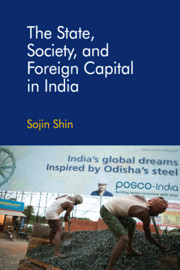Book contents
- Frontmatter
- Dedication
- Contents
- List of Tables, Figures, Illustrations, and Maps
- Acknowledgements
- 1 Introduction
- 2 FDI Inflows in India: Ideas, Interests, and Institutional Change
- 3 FDI Inflows in Tamil Nadu: Inclusionary Ideas, Weakened Interests, and Incremental Institutional Change
- 4 Making FDI Work in Tamil Nadu
- 5 FDI Inflows in Odisha: Weakened Ideas, Strong Interests, and Unstable Institutional Change
- 6 Making FDI Work in Odisha?
- 7 Conclusion
- Bibliography
- Index
2 - FDI Inflows in India: Ideas, Interests, and Institutional Change
Published online by Cambridge University Press: 08 July 2018
- Frontmatter
- Dedication
- Contents
- List of Tables, Figures, Illustrations, and Maps
- Acknowledgements
- 1 Introduction
- 2 FDI Inflows in India: Ideas, Interests, and Institutional Change
- 3 FDI Inflows in Tamil Nadu: Inclusionary Ideas, Weakened Interests, and Incremental Institutional Change
- 4 Making FDI Work in Tamil Nadu
- 5 FDI Inflows in Odisha: Weakened Ideas, Strong Interests, and Unstable Institutional Change
- 6 Making FDI Work in Odisha?
- 7 Conclusion
- Bibliography
- Index
Summary
A ‘tipping point’ model of economic change for India … highlights the explanatory importance of both home-grown ideas and politics. India's transition to globalisation and deregulation is a saga of a government promoting institutions that facilitated competitive markets within a democratic polity while powerful social actors opposed these changes.
How do socio–political factors influence institutional changes favouring FDI inflows in India at the union level? Ideas and interests can affect institutional changes. Some scholars in India's political economy have argued that the economic orientation and ideas of key policy-makers are decisive of institutional changes. However, others who take interests important have stressed the pluralist structure of society and various interest groups that influence institutional changes. By taking two socio–political sources – ideas and interests significant in the economic institutional changes, I would discuss how the ideas of key policy-makers in the state apparatus and various interests in society have affected institutional changes at the union level in India in the realm of FDI inflows. I conducted fieldwork in India from December 2011 to March 2012. I interviewed some of the political leaders, bureaucrats, and industrialists who had involved in the process of FDI inflows. Fieldwork findings present that the ideas of political leaders were competing between supporters and opponents of FDI. Also, the interests of different individuals and groups in society also varied towards FDI inflows.
Following a historical institutionalist approach that emphasises a role of political context in shaping an economic institutional change, this chapter explains the pattern of FDI inflows at the union level in India. I argue that the economic institutions favouring FDI inflows have gradually changed through an incremental FDI regime change from anti-FDI inflows (1969−75) to selective FDI inflows (1975−91) and further to pro-FDI inflows (1991 economic reform onwards). The discussion in this chapter proceeds following the periodisation. After that, the discussion focuses on the episodes of Foreign Investment Promotion Board (FIPB) relocation which was politically driven between key ministries having a role in promoting India's industrialisation.
- Type
- Chapter
- Information
- The State, Society, and Foreign Capital in India , pp. 23 - 49Publisher: Cambridge University PressPrint publication year: 2018

